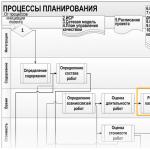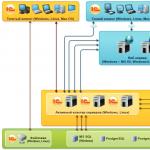How Sibur Holding became one of the largest and most important enterprises in Russia. Sibur - history of the Sibur industry brand
Characteristics of the structure of PJSC SIBUR Holding
In theory, the structure of an enterprise is understood as the composition and relationship of its internal links: workshops, sections, laboratories and other divisions that make up a single economic entity. There are general, production and organizational structures of the enterprise.
The general structure of an enterprise is understood as a complex of production and non-production divisions, their connections and ratios in terms of the number of employees, area, and throughput.
At the same time, production units include workshops and areas in which the main products, materials, semi-finished products, spare parts are manufactured, various types of energy are generated, and various types of repairs are carried out.
The organizational structure of enterprise management is an ordered set of management services, characterized by certain relationships and subordination. The group of managers and specialists, who are responsible for the development and implementation of management decisions, constitutes the enterprise management apparatus.
As of December 31, 2014, assets under the control of the Company were distributed between three business divisions - directorates:
· Directorate of hydrocarbon raw materials
· Directorate of synthetic rubbers
· Directorate of plastics and organic synthesis
Each of the directorates is responsible for the production and financial results of the enterprises it supervises and the total financial result of the Company for the entire range of products within its area of responsibility.
In addition, two property-separate and operationally independent holdings have been created within the structure of PJSC SIBUR Holding - a holding for the production of tires and rubber products (JSC SIBUR - Russian Tires) and a holding for the production of mineral fertilizers (JSC SIBUR - Mineral Fertilizers).
The holding for the production of tires and rubber products was created on the basis of OJSC SIBUR - Russian Tires. This holding includes the following enterprises:
OJSC "Omskshina"
JSC "Yaroslavl Tire Plant"
OJSC "Ural Tire Plant"
· JSC "Voltyre-Prom"
OJSC "Saransk plant "Rezinotekhnika""
· JV CJSC "Matador-Omskshina"
OJSC "Sibur-Volzhsky"
OJSC "Volzhsky Nitrogen-Oxygen Plant"
The holding for the production of mineral fertilizers was created on the basis of the Open Joint Stock Company SIBUR - Mineral Fertilizers (OJSC SIBUR - Mineral Fertilizers). As of December 31, 2014 This holding includes the following enterprises:
§ OJSC “Azot”, Kemerovo
§ OJSC "Mineral Fertilizers", Perm
§ CJSC "Angarsk saltpeter"
§ Angarsk Nitrogen Fertilizer Plant LLC
§ SMU Biysk LLC
§ SMU-Angarsk LLC
§ SMU-Perm LLC
§ SMU-Tyumen LLC
This structure makes it possible to combine centralized coordination of activities with decentralized management, according to which authority to resolve current and a number of tactical issues is transferred to the directorate level (for example, related to the selection of product buyers and raw material suppliers, as well as ensuring the stable operation of production facilities). For the structure of PJSC SIBUR Holding, see APPENDIX A.
", the shareholder structure of Russia's largest petrochemical holding SIBUR has changed. The main co-owners of the company included the deputy chairman of its board, one of the sons of businessman Nikolai Shamalov, Kirill. He bought 17% of the shares from Gennady Timchenko, consolidating 21.3%. The share of Mr. Timchenko himself will decrease up to 15.3%, but he is not going to completely withdraw from SIBUR’s capital.
Deputy Chairman of the Board of SIBUR Kirill Shamalov acquired a 17% stake in the company from businessman Gennady Timchenko, several sources close to the negotiations said. The amount of the transaction is unknown; the interlocutor familiar with its terms only stated that “the price is market.” Taking into account the shares he already owned, Kirill Shamalov became the owner of 21.3%. Gennady Timchenko reduced his stake to 15.3%; Leonid Mikhelson, who owns 50.2%, remains the largest shareholder of SIBUR. The petrochemical holding itself declined to comment yesterday. A representative of Gennady Timchenko confirmed the fact of the sale of 17% of the shares to Mr. Shamalov’s structures. NOVATEK only stated that “Leonid Mikhelson is completely satisfied with the existing share.”
According to representative Gennady Timchenko, the businessman began negotiations on the partial sale of a stake in SIBUR about a year ago, and “Kirill Shamalov was one of the interested parties.” At the same time, the issue of complete sale of the stake was not considered, since “Gennady Timchenko is interested in maintaining a minority position in an effective business.” A source close to the negotiations says that Mr. Timchenko also discussed the sale of securities with the head of SIBUR, Dmitry Konov, “as part of increasing the management’s share in the company.” But Mr. Konov refused “due to the debt burden of servicing loans from previous transactions.” As a result, according to the interlocutor, Dmitry Konov still owns just under 5%.
SIBUR is the largest processor of associated petroleum gas (APG) in the Russian Federation, owns the infrastructure for processing and transporting APG and natural gas liquids, produces base polymers, polyethylene, polypropylene, etc. Net profit according to IFRS for 2013 is 50.9 billion rubles, EBITDA — 78.9 billion rubles. Dividends amounted to 12.8 billion rubles. The company processed 19.6 billion cubic meters of gas, produced 5.3 million tons of broad hydrocarbons, sold 4.8 million tons of liquid hydrocarbons, and 2.1 million tons of petrochemical products.
Gennady Timchenko entered the capital of SIBUR in 2011, buying a stake from Leonid Mikhelson. The latter began purchasing shares of the holding from Gazprombank in 2010; he explained Mr. Timchenko’s arrival by good partnerships and difficulties in attracting cheap capital due to instability in the financial markets. Ultimately, Leonid Mikhelson consolidated 57.5%, Gennady Timchenko - 37.5%, and the remaining shares were distributed among SIBUR's top managers. Step by step, during the option program, the total share of management in SIBUR was increased to 17.5%, which is how Mr. Shamalov received 4.3% of the shares.
Kirill Shamalov was born on March 22, 1982 in Leningrad, graduated from St. Petersburg State University. Worked at Gazprom, Rosoboronexport, Gazprombank, and the government apparatus. He came to SIBUR in 2008 as vice president for administrative support, and in 2012 became deputy chairman of the board.
Kommersant's sources believe that Mr. Shamalov bought a stake in SIBUR with borrowed funds. The interlocutors do not know whether he will remain a top manager of the holding when he joins the board of directors of SIBUR, but they believe that “this is not a question of today.” There are precedents for large co-owners of companies remaining as second-level managers - for example, LUKOIL Vice President Leonid Fedun (almost 10% of shares). In 2011, Gazprombank valued SIBUR at RUB 225 billion. Grigory Birg from Investcafe notes that SIBUR is a non-public company, so it is quite difficult to give objective estimates of the value. Taking into account the multiple growth of EBITDA and implemented investment projects in recent years, the market price of the holding most likely already exceeds $10 billion (about 370 billion rubles), the analyst believes. However, he adds, the deal with Kirill Shamalov could have gone through at a discount.
Gennady Timchenko was blacklisted by the United States back in the spring, but this had no effect on SIBUR, since the businessman’s stake was initially much lower than the control one. At the same time, Mr. Birg adds, Mr. Timchenko said that he wants to focus on infrastructure projects, so reducing the share in SIBUR looks logical.
Strategic partner, selling 10% of its shares to the Chinese Sinopec for $1.338 billion (estimated by FAS head Igor Artemyev). Based on this transaction, Mikhelson’s entire stake in Sibur could be worth $5.7 billion, and the share transferred to four new LLCs (18.5% of Sibur) could be worth $2.48 billion.
A government commission gave Sinopec permission to purchase up to 20% of Sibur shares. Whether the Chinese corporation is going to increase its stake in the company is unknown. The Sinpec press service did not respond to RBC's request.
Volga Group representative Gennady Timchenko ( owns 14.2% of Sibur ) said that the company had not received or considered proposals to purchase part of Mikhelson’s share in the petrochemical holding. Representative of the other largest co-owner of Sibur - Kirill's Ladoga Management Shamalova (20.9%) - stated that he was also not offered to increase his stake in the company. The FAS has not yet received any requests for the purchase of new co-owners of Sibur (Gamma, Omega, Sigma and Prime), a representative of the department said.
Now funds are needed for another Mikhelson project - Yamal LNG, a subsidiary of NOVATEK. In an interview with the Rossiya 24 TV channel, Mikhelson said that he expects within “the next two to three months” in full “close the issue” of external financing - sign loan agreements with banks. According to him, now $13 billion has been invested in the project (including $2.4 billion from the National Welfare Fund), and the total investment volume is estimated at $27 billion, that is, about $14 billion more are needed.
NOVATEK itself does not need loans (in 2016 the company must repay 106.6 billion rubles of debt, but it has already opened credit lines for 50 billion rubles and $300 million, which it has not yet used), and Yamal LNG is agreeing on a project financing, and NOVATEK’s management has long promised to sign a deal with banks, says senior analyst at Aton Investment Company Alexander Kornilov. However, it is unlikely that this will require collateral from Mikhelson, because negotiations are being conducted with a consortium of banks and project financing does not imply collateral from shareholders, he stipulates. Kornilov suggests that Mikhelson might need the funds for personal projects.
A representative of Sberbank, one of NOVATEK's largest creditors, declined to comment. A representative of another lender, Gazprombank, has not yet responded to RBC’s request.
Last week, Mikhelson was the richest Russian for the first time, according to Forbes magazine, with a fortune of $14.4 billion; he took 60th place in the world ranking. Over the year, the businessman’s fortune increased by $2.7 billion, largely due to the appearance of the first public valuation of Sibur after the deal with Sinopec. The businessman could have earned about $940 million from this deal - after the emergence of Sinopec, his share in the petrochemical holding decreased from 50.2 to 43.2% (his representative did not comment on this).
1) A call from a girl from a recruiting company (deleted), she offered a job in Sibur for a salary of 150,000 rubles, we talked for half an hour, verified my basic knowledge of petrochemicals and English, promised to send online tests
2) They sent online tests (absolutely idiotic, I must say, and with a time limit), I failed them (as it turned out later, no one will show you the result right away...), the girl called back and offered to take them for me, she passed them for me so that I could continue to go through the stages, well, I was happy and thanked her. She promised that there were 2 more stages ahead, Sibur needed just such a special one. in the field of films, with experience in developing their own product, etc. (apparently she was making noodles, and I was inspired like a fool)
3) I came to social security an hour and a half in advance (because motherfucker is important, I sat there preparing as if before an exam), I tried to get inside to wait there and not in the car, the terminal didn’t give me a pass, I sat like a fool and waited for an hour, half an hour before Social Security called everyone and said that the terminal does not issue a pass, although it should be time. The girl from (deleted) tried to help, HR Sibur called back at 9:03 (she just didn’t answer the phone until 9, you see), as a result, by this time the pass was activated
4) No one met me, didn’t offer me tea or coffee, I stomped into the office, 2 confused students were sitting there, in the end, after 15 minutes of waiting, they took me to some kind of meeting room
5) A MAXIMUM cold and distant girl sat in the meeting room and asked stupid questions (the boss, who was supposed to be at the interview, was 10 minutes late). As a result, they asked me a couple of stupid questions that were not related to the specifics of my future activities from the series “when will you get married?”, “How are you?”, when I tried to start a conversation on the topic of petrochemicals, they simply nodded their heads AND NOT ASKED A SINGLE QUESTION, although I had something to tell. The boss had to retell everything in a new way, what I had already been telling HR for 10 minutes... As a result, after 15 minutes of idiotic questions, they simply patted me on the shoulder and said, well, good luck, we’ll recruit you, do you have any questions? I say yes, there is a question, why the hell did I come to interview for a specific vacancy, where specific skills and abilities are needed, I told about your turnover, about the new plant, about the basic brands, about the potential client base, and you asked me general abstract questions about what I received an incredibly stupid answer: “Well, we don’t hire anyone for a specific vacancy, first you need to understand what you can do and what you want, and we’ll think about where to place you.” I sit and think, yeah, that is, I will go to your stupid interviews for a month, and at the end you will offer me a job for 50,000 rubles and a basic position? In the end, I said goodbye and left, a week later they called back and said, “Well, you didn’t pass,” which I was rather glad about.
In short, it’s as disgusting as possible, I prepared for a week for the interview, arrived an hour and a half in advance, only to have some young marketing manager and slow HR dump me after basic questions, I had the feeling that they took me just for show, for statistics, and they would put me in the position some stupid friend or someone else.
P.S. To the boss’s only question about the future volumes of Sibur, I began to give calculations, a clear and specific answer, laid out in detail, including a bunch of variables, he listened, waved his hand at me and said, “I’ll give you a hint, volumes depend on capacity,” in short, it was just necessary to say like a fool “Your volumes will increase, you have built a new plant”, I completely fell out of this, I mentioned this twice during the interview, why should I ask a stupid question about a new plant if I am aware of its capacities even better than this boss?
Sibur Holding is the largest petrochemical holding in Russia. Full name: Public Joint Stock Company SIBUR Holding. The headquarters is located in Moscow (the company is registered in Tobolsk).
OJSC Siberian-Ural Petroleum and Gas Chemical Company was created by Decree of the Government of the Russian Federation of March 7, 1995. Initially, the company included the association Sibneftegazopererabotka (GPP of Western Siberia), NIPIgazpererabotka (Krasnodar) and the Perm Gas Processing Plant.
In 1998, the company was privatized, Gazprom became the largest shareholder of the holding, but real control over production and economic activities passed to the Gas and Petrochemical Company of Yakov Goldovsky. During 1998-2001, the company included a significant part of Russia's petrochemical assets and became the country's largest petrochemical holding.
At the end of 2001, the company's management, led by Yakov Goldovsky, attempted to dilute Gazprom's share in the company's authorized capital by conducting an additional issue of ordinary shares, and previously tried to remove Sibur's petrochemical assets from the legal control of the company. In response to this, OJSC Gazprom initiated bankruptcy proceedings for the company in March 2002.
The process of negotiations with creditors regarding the terms of debt restructuring lasted more than six months and ended on September 10, 2002 with the signing of a settlement agreement. According to some reports, the decisive factor in this was forceful pressure and the subsequent arrest of the then co-owner of Sibur, Yakov Goldovsky (the arrest was carried out in the reception room of the chairman of the board of Gazprom, Alexei Miller). After the transfer of shares in Sibur to Gazprom, Goldovsky was released, lived for some time in Austria, but then returned to the Russian petrochemical business (Dzerzhinsk enterprise Korund).
In 2002, in order to organize centralized sales of products from Sibur tire enterprises, SIBUR - Russian Tires LLC was created. For three years, from 2002 to 2005, the company systematically developed its sales and production activities and in the spring of 2005 introduced its first “branded” products to the market - tires under the Cordiant and Tyrex trademarks. In February 2007, the company changed its organizational form and acquired its current name OJSC SIBUR - Russian Tires.
In July 2005, SIBUR established AKS Holding OJSC (the legal successor of which is today's SIBUR) to “cleanse” the holding company of debts in the amount of 60 billion rubles, most of which is due to the debt to the parent company. The shares of 26 petrochemical enterprises belonging to SIBUR were transferred to the balance sheet of this OJSC. In December 2005, AKS Holding was renamed SIBUR Holding.
In 2007, Gazprom sold shares of Sibur to Gazfond as part of an exchange for energy assets owned by this structure. Both Gazprombank and Gazfond also left the Gazprom group.
In 2008, Sibur planned to merge SIBUR - Russian Tires with Amtel-Vredestein, but the deal did not take place due to the crisis. At the end of December 2011, Sibur completely parted with control over OJSC SIBUR - Russian Tires, selling 75% of the shares to the company's management, and the remaining shares to the partners of the company's general director Gurinov.
On December 3, 2010, it was announced that Gazprombank would sell 50% of the company to the structures of Leonid Mikhelson, co-owner and chairman of the board of the gas company Novatek.
In September 2011, after receiving permission from the FAS, Mikhelson’s structures purchased additional shares and his share exceeded 50%.
At the end of 2011, SIBUR sold its assets in the mineral fertilizer business to Uralchem (Minudobreniya, Perm) and the Siberian Business Union (Azot, Kemerovo, and Angarsk Nitrogen Fertilizer Plant, Perm). Angarsk).
In November 2011, Sibur Limited became a 100% shareholder of Sibur, the ultimate beneficiaries of which are the shareholders of Novatek OJSC: Leonid Mikhelson and Gennady Timchenko. The beneficiaries of the remaining 5.5% of the authorized capital of Sibur Limited were Sibur managers Dmitry Konov, Mikhail Karisalov, Mikhail Mikhailov, as well as deputy chairman of the board of directors Alexander Dyukov. In 2013, the main shareholders of Sibur reduced their stake in the company to 82.5%, and the share of current and former management increased to 17.5%.
In 2014, the structure, the founder and owner of which is SIBUR Deputy Chairman of the Board Kirill Shamalov, acquired 17% of SIBUR shares, the beneficial owner of which was previously Gennady Timchenko.
On December 17, 2015, a deal was closed to acquire a 10% stake in Sibur by the Chinese company Sinopec, which valued the entire Russian company at $13.4 billion.
The company's revenue according to IFRS in 2015 amounted to 380 billion rubles, EBITDA - 136 billion rubles. The company's total investment in 2015 amounted to 84.4 billion rubles.






